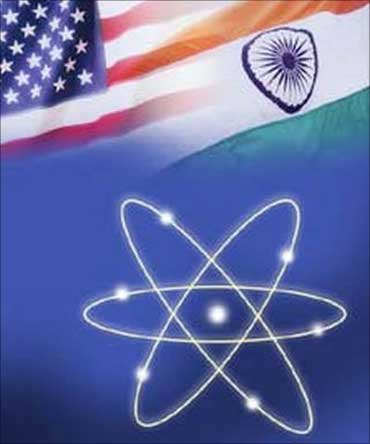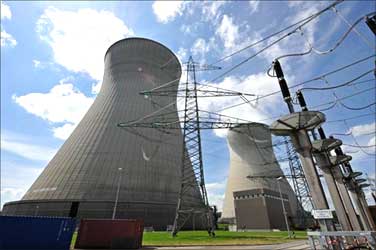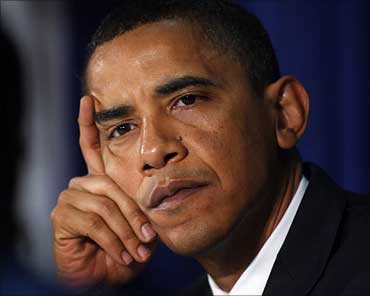 | « Back to article | Print this article |
Corporate America's angst over N-deal is misplaced: Sharma
Union Minister of Commerce and Industry Anand Sharma said that the US business and industry's angst over the nuclear liability bill approved by the Indian parliament is misplaced and the concerns expressed have arisen because the legislation has been misread.
During the question and answer that followed his remarks at the Council on Foreign Relations on US-India Relations, Sharma responding to the contention that some provisions in the bill were "not exactly favorable towards US industry," said, "I think that it is being misread."
"First, this was the demand of the industry and our partner countries that we should have a nuclear liability bill passed by the Indian parliament. We have entered into civilian nuclear cooperation agreements with the United States of America, with the Russian Federation, with France, with the United Kingdom, with Canada, with Brazil, and we are going to do so with some other countries too."
Thus, Sharma argued that the question has to be put "in the historical perspective and global context," and explained, "For three decades, or more than three decades, there was this hiatus when India was not part of the global mainstream, and the reasons are fairly well known. We've always had an impeccable track record, our credentials were never questioned."
Click on NEXT to read more...
Corporate America's angst over N-deal is misplaced: Sharma
He said the "principal position which we took, influenced primarily by our own security considerations and India's supreme national interest, which was recognised, and we fully appreciate and acknowledge the understanding and the support which India received from the United States of America into entering into an agreement which is India-specific with the IAEA, and also getting the NSG waiver in the year 2008."
Sharma said, "Now, for this cooperation to move forward, our partners wanted legislation in India on this subject, (but) now, legislation is not an executive act-it goes to parliament."
"Let me tell you, unlike our big neighborhood, we are a multiparty democracy where every piece of legislation is very fiercely dissected and debated," he said, and while acknowledging that "we are in the majority in parliament, we do not have, even as a government, a monopoly over the members, because we have a substantial opposition. And they also have to vote along for a legislation to become an act of parliament."
Sharma said as a result the bill had undergone intense scrutiny from the standing committee and even the standing committee recommendations, "all of which the cabinet did not accept, but the cabinet debated it, and this particular clause which you are referring to is about the liability that's applied."
Click on NEXT to read more...
Corporate America's angst over N-deal is misplaced: Sharma
He said this provision was "a very limited one-the 17 (d), it's very limited," and exhorted that the bill be read in its entirety and not just a clause. "A clause in itself does not override the objectives of the legislation. So it has to be put in the whole body of the bill."
Sharma reiterated that this provision "is only one small aspect. Now, we could not have a bill which is called civil nuclear liability bill, removing the word 'liability' from it. In the legislation, minus the word 'liability' would not be accepted to the parliament. But as I use the word, it's very limited."
"At the same time-and we have the captains of industry sitting there and those who are sitting here and they know-there are liabilities even for the domestic industry when it comes to these sectors, chemical sectors and other. Any country, even yours, will have its own legislation."
Click on NEXT to read more...
Corporate America's angst over N-deal is misplaced: Sharma
Sharma, obviously attempting to ameliorate the concerns of US business and industry -- who went to bat for the deal in the US Congress and even hired multi-million dollar lobbyists to push the agreement through the US Senate and House and as a quid pro quo expected to get the lion's share of the Indian nuclear energy market-said what would happen now would be that "there will be agreement between the equipment manufacturers and the operators. That will be separate. Those will be individual commercial agreements."
"Presently many are under negotiations, for India is buying many reactors from France, from Russia, and those negotiations are on," he pointed out. "So those will be individual agreement between the operating company, which in this case is the Nuclear Power Corporation of India, Limited."
And, Sharma said, "I'm sure that if there are any concerns, when the equipment manufacturer and the equipment user ion the operating company, they negotiate an agreement, they will get addressed."
Click on NEXT to read more...
Corporate America's angst over N-deal is misplaced: Sharma
Thus, he said "I feel that the concerns are misplaced. Those concerns have enough room to be address without any controversies."
The US-India Business Council in expressing its concerns when the bill was approved by the parliament said, "The absence of an effective, CSC (Convention on Supplementary Compensation)-compliant liability regime could preclude involvement by the private sector-both Indian and foreign-and stymie India's multi-year effort to develop civil nuclear power."
Ashley Tellis, senior associate, Carnegie Endowment for International Peace, and former Bush administration official who was closely involved in negotiating the deal, in an interview with rediff.com, warned that the legislation that was perceived as unacceptable would adversely affect the US-India civil nuclear deal.
In warning of the political consequences, he said, "Both US industry and the Obama administration are upset that that the Indian government has failed to deliver after all the efforts made in Washington to complete the deal to India's satisfaction and despite early assurances to the US that the Indian legislation would be fully compliant with the Convention on Supplementary Compensation."
He predicted that it would "eviscerate all the gains that the Prime Minister (Dr Manmohan Singh) secured by signing the deal."




